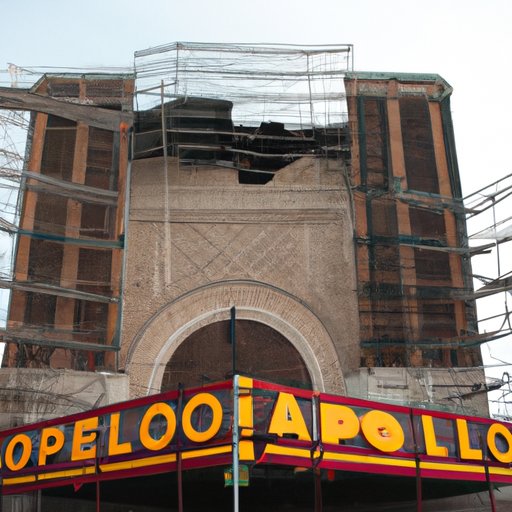Introduction
The Apollo Theater has been a mainstay of the Harlem neighborhood in New York City since 1934. It has served as a stage for some of the greatest musical acts of all time, from Billie Holiday to Michael Jackson. It is a symbol of African American culture and has become an iconic landmark in the United States. As one of the most famous theaters in the world, many wonder when it was first built. This article seeks to answer this question by exploring the history of the Apollo Theater, its cultural impact, and its legacy.
A History of the Apollo Theater – Tracing Its Construction and Cultural Impact
The Apollo Theater has a long and varied history. It began as a burlesque theater in 1914, originally called Hurtig and Seamon’s New Burlesque Theater. It was then renamed the Apollo Theater in 1934, after the Greek god of music and poetry. The theater quickly became known as the “Mecca of the popular arts” and was the place to go to see the latest musical acts.
Early Years of the Apollo Theater
In its early years, the Apollo Theater was managed by Sidney Cohen and Jules Hurtig. They brought in a variety of acts, including jazz, blues, gospel, and comedy. The theater soon became a hot spot for up-and-coming performers, with appearances by Ella Fitzgerald, Sarah Vaughan, and Duke Ellington. This helped to cement the Apollo Theater’s place as a major venue for African American performers.
The Impact of the Apollo Theater
The Apollo Theater had a major influence on the development of African American music and culture. It was a safe space for African Americans to come together and enjoy music. It also provided an opportunity for African American performers to showcase their talents. The Apollo Theater was instrumental in launching the careers of many performers, including James Brown, Aretha Franklin, and the Jackson 5.

How the Apollo Theater Changed the Face of Music and Entertainment
The Apollo Theater has had a lasting impact on the world of music and entertainment. It has been credited with helping to create several different genres of music, such as rock and roll and soul. It has also provided a platform for African American performers to gain recognition and success.
Birthplace of Genres
The Apollo Theater has been credited with helping to create several different genres of music. It was home to jazz, blues, gospel, and soul music. It was also a place where new genres, such as rock and roll, were born. Performers such as Chuck Berry, Little Richard, and Fats Domino performed at the Apollo Theater and helped to shape the sound of rock and roll.
Influential Performers
The Apollo Theater has been a launching pad for many influential performers. It was here that the careers of James Brown, Aretha Franklin, and the Jackson 5 were launched. These performers went on to become some of the biggest names in music. The Apollo Theater also provided a platform for lesser-known performers, such as Lauryn Hill, who went on to have successful careers.
The Legacy of the Apollo Theater: When Was It Built?
The Apollo Theater has been around for over 80 years and has left a lasting imprint on the world of music and entertainment. To understand when it was built, it is important to look at the timeline of events leading up to its construction.
Timeline of Events Leading Up to the Construction
The Apollo Theater was built in 1934, but its history can be traced back to 1914. In 1914, it was opened as Hurtig and Seamon’s New Burlesque Theater. In 1934, it was renamed the Apollo Theater. It quickly gained fame and notoriety and became one of the most popular venues in the city.
Exploring the Architecture
The Apollo Theater was designed by architect George Keister. He created an Art Deco style building, which featured a curved façade and an ornate marquee. The interior of the theater included a large stage and seating for 1,500 people. It also featured a balcony, which allowed for better viewing of the performances.
The Apollo Theater’s Rise to Fame: When Was It Built?
The Apollo Theater quickly rose to fame in the 1950s and 1960s. It was a popular destination for music lovers and provided a platform for African American performers. The theater’s popularity continued to grow in the following decades.
Popularity in the 1960s
In the 1960s, the Apollo Theater reached its peak in popularity. It was a popular destination for music lovers, and it hosted some of the biggest names in music, such as Aretha Franklin, James Brown, and the Jackson 5. The Apollo Theater was also a popular stop on the Chitlin’ Circuit, which was a network of African American venues across the country.
Becoming a National Landmark
The Apollo Theater was designated a National Historic Landmark in 1983. This recognition highlighted the importance of the theater and ensured its preservation. It also cemented its place in the history of American music and culture.
Conclusion
The Apollo Theater has been a mainstay of the Harlem neighborhood since 1934. It has served as a stage for some of the greatest musical acts of all time and is a symbol of African American culture. This article explored the history of the Apollo Theater, tracing its construction and cultural impact. It was found that the Apollo Theater was built in 1934 and has had a lasting impact on the world of music and entertainment. It has provided a platform for African American performers to gain recognition and success, and it has been credited with helping to create several different genres of music. The Apollo Theater has become an iconic landmark and will continue to be a source of inspiration for generations to come.
(Note: Is this article not meeting your expectations? Do you have knowledge or insights to share? Unlock new opportunities and expand your reach by joining our authors team. Click Registration to join us and share your expertise with our readers.)
